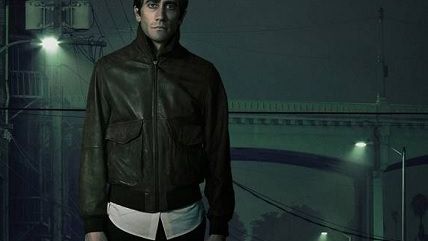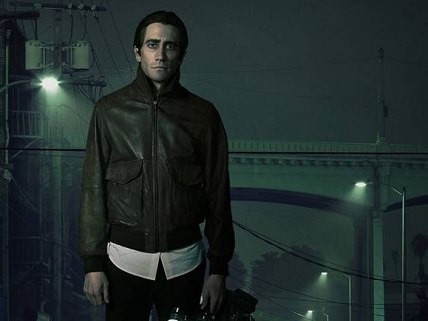Nightcrawler and Horns
Jake Gyllenhaal brings the creepy, Daniel Radcliffe gets lost in a failed fright flick.


Nightcrawler is a steely LA noir that trains a searchlight on the TV news business, and flushes out some of its creepiest denizens.
Jake Gyllenhaal plays Louis Bloom, a petty thief who's getting nowhere scavenging scrap metal for a local junk dealer. Driving down a freeway one night, he spots a blaze of spinning lights and a group of cops and medics pulling a blood-soaked driver from the wreckage of a car. Louis gets out to gawk and meets a freelance news cameraman named Joe (Bill Paxton), who's been drawn to the scene like a maggot to meat. Joe explains that he's a "nightcrawler," prowling the dark hours in search of crashes and crimes, then quickly selling his footage to local-news stations, which thrive on this stuff. ("If it bleeds, it leads," he chuckles, recycling an ancient tabloid maxim.) It's a job that requires the soul of a snake, but the money's good. Louis thinks he may have found his calling.
Gyllenhaal gives an intense, gripping performance. His Louis is an icy sociopath, living in solitary contentment with a laptop and a big-screen TV (both stolen, presumably), his only companion a sad potted plant. The actor says he lost nearly 30 pounds for the role, and his cadaverous, dead-eyed countenance is the movie's most disturbing element. Louis sets himself up in business by trading a stolen bike for a pawnshop camera and an old police scanner, and as he cruises the city in search of useful horrors, writer-director Dan Gilroy, working with the Oscar-winning cinematographer Robert Elswit (There Will Be Blood), gives us a haunting Los Angeles nightscape of empty streets and eerie silence, with coyotes moving through the hills on grisly quests of their own.
Louis finds an eager buyer for his fledgling efforts in Nina (Rene Russo), a news producer at the city's lowest-rated station. Louis' footage is unusually gruesome, but Nina knows it's ratings gold—and with a sweeps month coming up, she knows she'll have to start attracting more viewers or lose her job. She tells Louis to bring her more of this good stuff: "Think of our newscast as a screaming woman running down the street with her throat cut," she says.
Modestly enriched by Nina's fees, Louis hires an assistant, a desperate loser named Rick (Riz Ahmed), whom he tries to inspire with gales of stale self-improvement clichés (the only language in which he's fluent). He also upgrades his professional technique, dragging dead bodies into the light to get better "news" shots and beating the police to crime scenes in order to generate really exclusive coverage.
Before long, Nina is hooked—she knows that without Louis' grim footage, she'll lose the slowly growing audience for her newscast. Louis knows this, too, and in a scene filled with hooded menace, over an awkward dinner in a Mexican restaurant, he informs Nina that his price has gone up—and it will cost her more than just money.
Gilroy is already a well-regarded screenwriter (he scripted The Bourne Legacy with his brother, Tony Gilroy). Here, directing his first movie, he reveals a sleek, fully formed style, greatly enhanced by meticulous editing (by his other brother, John Gilroy) and by James Newton Howard's subtly ominous score. Gyllenhaal's Louis is of course too completely depraved to function as an indictment of the entire TV news industry. But as the logic of tabloid television bears ever downward, you might wonder if there's a limit to the public appetite for sleaze that it serves. And if that limit will ever be reached.
Horns
The problem with a movie about a guy who suddenly sprouts big fake horns on his head is that for nearly two hours you have to watch a guy running around with big fake horns on his head. This isn't as much of a distraction in Joe Hill's 2010 novel, Horns, because you're not reminded of the physical absurdity on every page. But in Alexandre Aja's movie adaptation of the book, the horns are just about ever-present. And they're very silly. So although the picture is being released on Halloween, it fails to be especially scary.
Daniel Radcliffe plays the oddly named protagonist, Ig Perrish. Ig is being driven to drink by packs of baying journalists and angry townsfolk who hound him at every turn, convinced that he killed his sweet girlfriend, Merrin (Juno Temple), and has cheated justice through an unfortunate lack of hard evidence. Ig knows that the results of a DNA test would have cleared him, but they were lost when the testing lab mysteriously burned down.
Then the horns appear. Ig doesn't know why they're suddenly poking out at his hairline (nor do we), and he's baffled by the effect they have on people. A mild-mannered doctor invites Ig to join him in snorting some OxyContin. Two butch cops who've been giving him a hard time suddenly start making out in their squad car. The town tramp (Kelli Garner) suddenly starts stuffing her face with donuts (a very puzzling scene). Worst of all, Ig's mother and father (Kathleen Quinlan and James Remar), previously supportive of their besieged son, now inform him that they know he's guilty, and wish he'd go away. "These days, I bring out the worst in people," Ig says.
Ig's brother Terry (Joe Anderson) remains loyal, and so does his lifelong friend Lee (Max Minghella). Sustained by their belief in him, he sets out to discover who actually did kill Merrin, bashing her face in with a rock right outside the forest treehouse where she and Ig had been meeting up ever since childhood. The murder turns out to be only moderately mystifying, and it doesn't take us long (or not as long as it takes Ig) to figure out who the killer is.
The movie has some baldly horn-centric comic touches: one character plays a horn (he's a trumpeter) and another actually asks Ig if he happens to be horny. The story grows darker toward the end, though, and tonal complexity isn't Aja's strong suit—he's more at home with retro-slasher films (High Tension) and jokey remakes (Piranha 3D). Radcliffe is a problem, too—he can't really carry the picture all the way through its over-extended length. He's been adventurous in trying to establish a grownup career with his post-Potter film and theatre projects, and he was very appealing in the recent What If, with Zoe Kazan. Here, though, his narrow dramatic range, like the movie's jumbled intentions, are unfortunately front and center.


Show Comments (11)